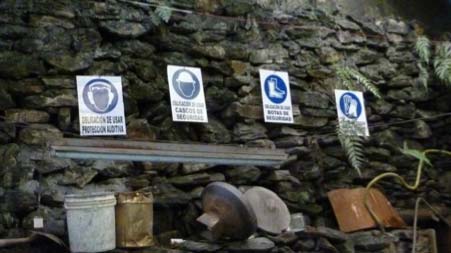
In Bolivia, some cooperatives exert the rules on environmental regulation and occupational health. Others violate these rules. Controls on environmental regulations are incidental and not too hard-pressed.
The Bolivian Northern Amazon region has for long time remained out of scope and control of the national government. Gold mining in this frontier region was informal. In 1997 the Mining Code was promulgated and in that same year the Environmental Regulation for Mining Activities (ERMA) came into being. The Mining Code has been modified in 2014. It is not yet clear how the bill connects to the earlier ERMA-legislation, but there is broad suspicion that verbal acknowledgement of environmental care is accompanied by ineffective control on, especially, cooperative operations.

Safety instructions at a mine in Cotapata, Bolivia, 2011. Photograph by M. de Theije
In Madre de Dios, the region of study by GOMIAM, we found the Cooperative Asobal has a lot of rules for their members when it comes to environmental regulation. The cooperative also supports their members in complying with these environmental rules. Hence, there are important differences between cooperatives: some abuse the results of the power-play by FENCOMIN (the interest group of mining cooperatives) and violate the regulations in place. Other prefer to comply, because they don’t want to be hampered by controls.
Sometimes cooperatives search for help among NGO-like organizations that can coach them with environmental regulations. For example Cumbre del Sajama, a private company working in the highlands of Bolivia, promotes the incorporation of social responsibility in mining activities.
Read/See more:
Fair gold project in the Bolivian Highlands.
Fair Gold Bolivia.
Article about promulgation of the new Mining Law.
